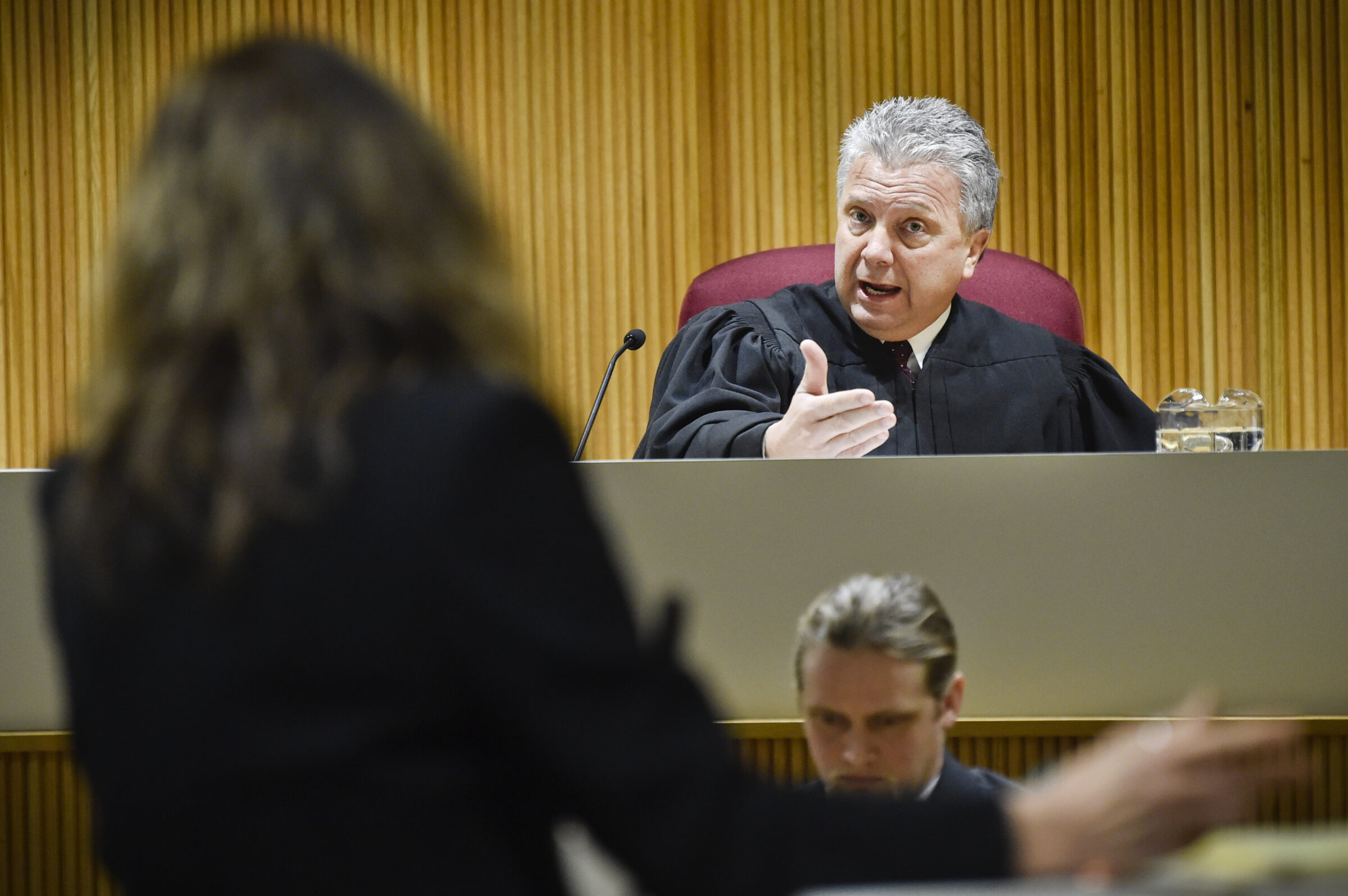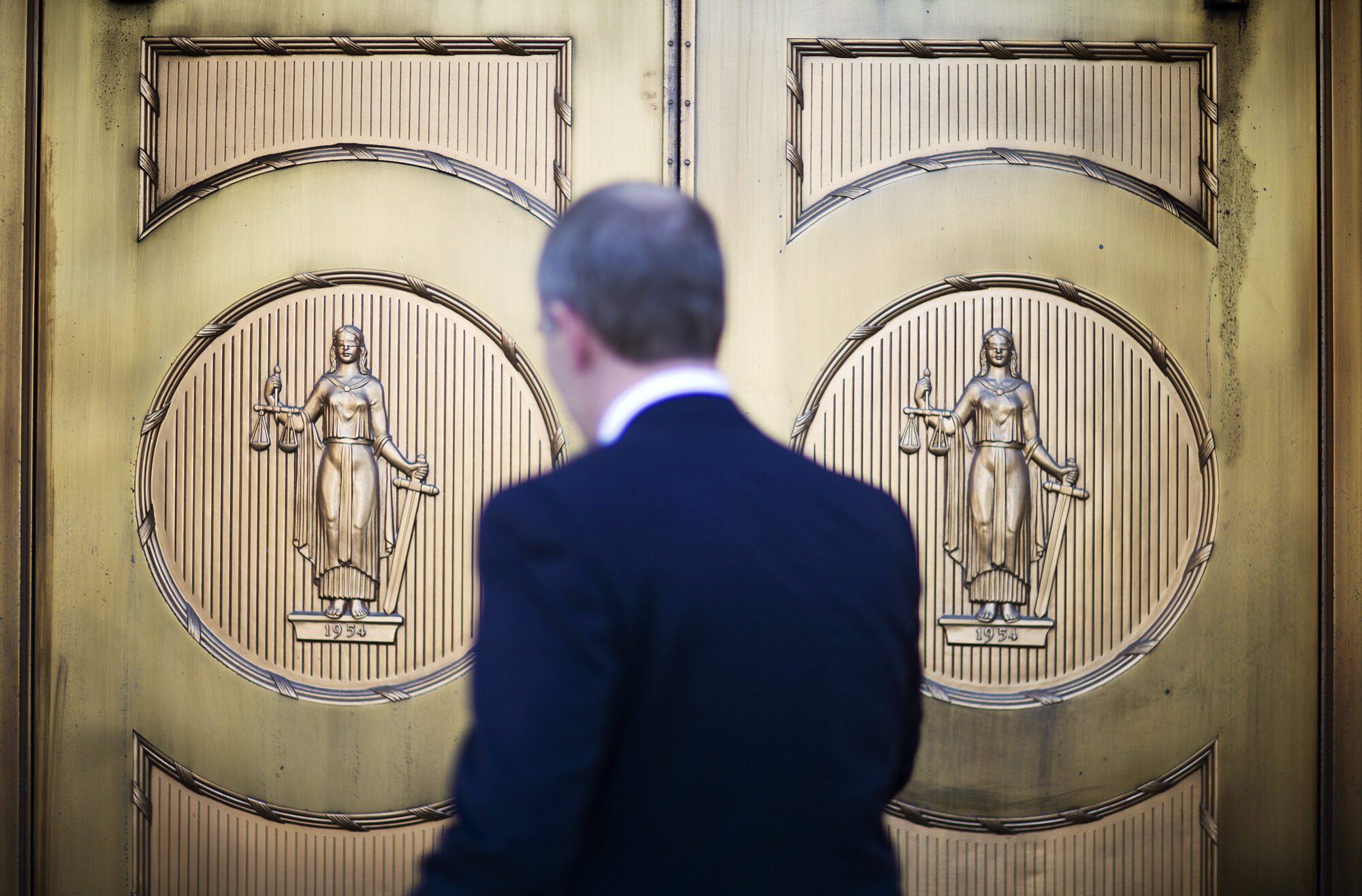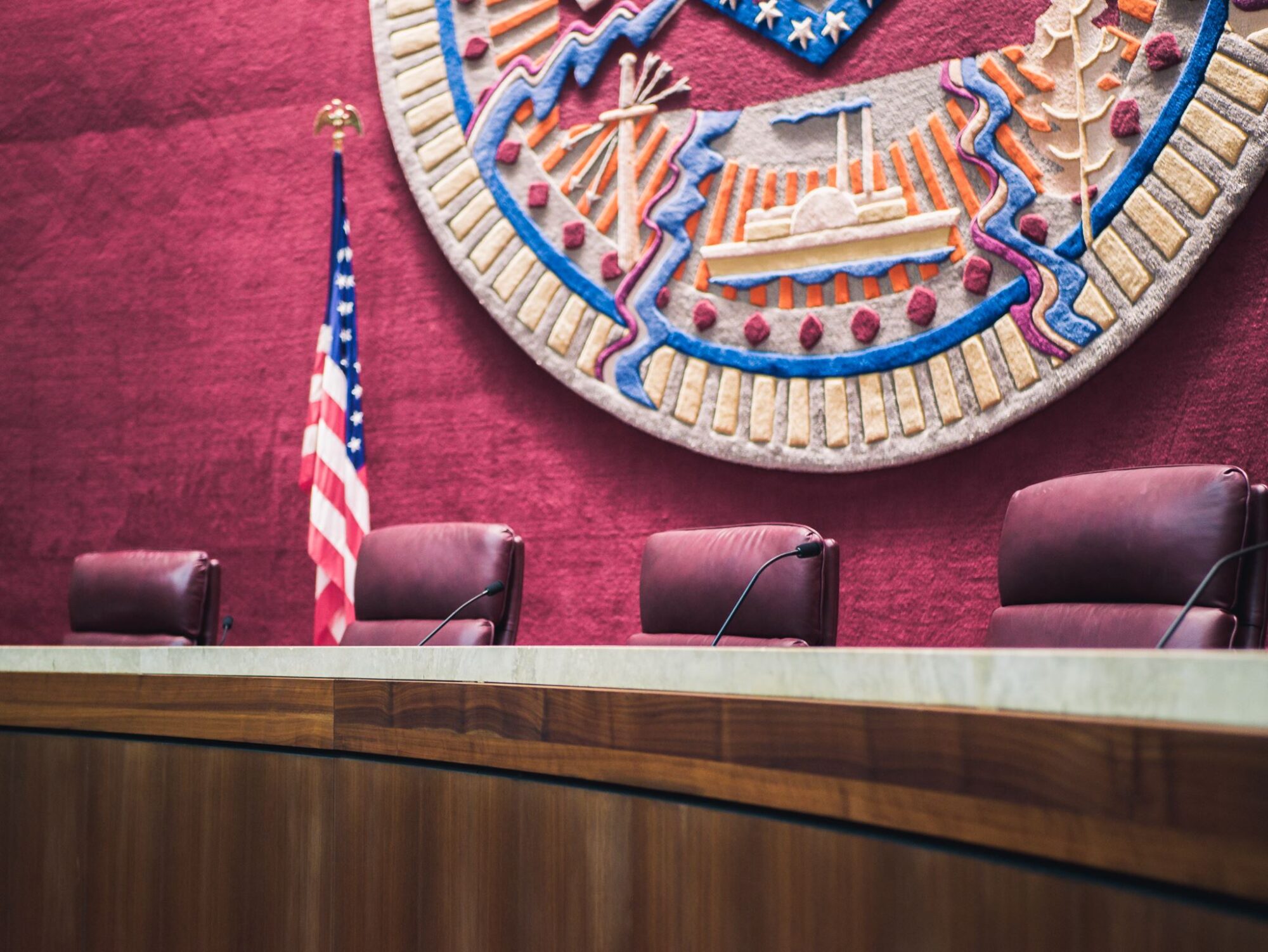“It’s Our Last Backstop”: How Voting Access in Montana Rides on Supreme Court Races
Montana’s high court has unwound GOP priorities, including striking down voting restrictions this spring, but conservatives hope the November elections land them a friendlier court.
| September 19, 2024

Editor’s note (Nov. 6): Cory Swanson, who was backed by conservative interests, and Katherine Bidegaray, who was backed by liberal interests, won Montana’s two supreme court seats on Election Day.
Montana Republicans have been trying to make voting harder, but they’ve hit a wall at the state supreme court.
This high court leans liberal in a state that has otherwise grown quite conservative, and so it’s been a regular thorn in the side of GOP politicians as they’ve tried to advance their agenda. That’s been true on voting issues, but also on guns, abortion, trans rights, and more.
This year, two justices who have drawn Democratic support in the past—including the chief justice, who authored a decision national liberals cheered a decade ago for its defiance of the U.S. Supreme Court’s Citizens United ruling—have chosen to retire rather than seek a new term. And conservatives see this as a major opportunity to reshape the court in their favor.
The court is ostensibly nonpartisan and the retiring justices have not always aligned, including on voting rights matters, but conservative victories in the contests to fill their two seats could boost the right’s interests in a venue that has long frustrated them. Under the shadow of Democratic U.S. Senator Jon Tester’s difficult reelection bid, these races test whether Montanans, who’ve voted in Republicans to run the legislative and executive branches, and are likely to do so again this fall, maintain any appetite for counterbalance.
The stakes for election administration are especially high, with Montana Republicans having already aimed for a string of restrictions that, but for the court, would be in law today.
In 2021, the first year since 2004 in which the GOP fully controlled the state government, lawmakers moved quickly to limit ballot access, passing a string of bills to end same-day voter registration; limit voting opportunities for people who turn 18 close to an Election Day; make voter ID standards stricter; and ban people from being paid to collect ballots on behalf of people who cannot file them on their own or who prefer not to.
Voting rights advocates could expect no relief from the governor, Republican Greg Gianforte, nor from Montana’s top elections official, Republican Secretary of State Christi Jacobsen, who backed these reforms from the start. Gianforte and Jacobsen both endorsed the changes in the name of fighting voter fraud, a conservative refrain in the wake of the 2020 election.
That left only the Montana Supreme Court. “It’s our last backstop,” Keaton Sunchild, director of civic engagement at the nonprofit Western Native Voice, told Bolts recently.
Sunchild’s organization was part of a coalition, including the state Democratic Party and various Native American groups, that sued over the 2021 voting restrictions. In March of this year, the state supreme court struck down each of the four laws that the GOP passed in 2021 in a decision that made clear the court’s investment in keeping elections accessible and in fending off attempts to curtail voters’ rights.
“The legislature’s responsibility” to shape the state election system “must be carefully scrutinized against our most basic right to vote,” that decision stated.
The court denounced the reforms for their potential to significantly suppress turnout and called out Jacobsen for alleging significant voter fraud but never offering proof. Jacobsen, who is running for reelection this fall, told local media she was “devastated” by the decision.
“In this particular moment, the court appears to be the only government actor that is interested in ensuring that there is robust ballot access, consistent with the constitution, and that has the ability to do something about it,” University of Montana assistant law professor Constance Van Kley told Bolts. (Jacobsen has since appealed to the U.S. Supreme Court, arguing that a state supreme court lacks the authority to review election laws. The federal justices already rebuffed that notion, known as the independent legislature doctrine, in 2023.)
Today, justices who ran with conservative backing claim just two of the court’s seven seats, and neither of them is on the ballot this year. There’s no partisan affiliation in Montana’s judicial elections, but partisan groups often take sides in their races.
So if the right sweeps the two seats that are up this fall, it would mean that justices with past conservative backing have secured a majority on the court.
But in practice, the lines on this court are much blurrier, and the justices have often formed peculiar alliances. For example, one of the two justices with past conservative support, Laurie McKinnon, sided with liberal justices earlier this year when she voted to strike down the GOP’s four 2021 restrictions on voting rights.
One of two justices who dissented in the overturning of those laws is Dirk Sandefur, whom Republicans aggressively tried to unseat in his last reelection bid. Sandefur, who is retiring this year, wrote in his dissent that courts should not act as a “super-legislature” and second guess lawmakers who “merely regulate” voting, though he did side with the majority in striking down one of the four GOP laws.
Said Van Kley, of Sandefur’s dissent and of the court generally, “Judges haven’t always been exactly who people thought they’d be when they voted them in. As much as you have people out there who are trying to tell voters that you’re going to get specific things from specific candidates, I don’t think history suggests that is going to be the case.”
The court this year unanimously struck down a law requiring parental consent for people under 18 who are seeking abortions, and it voted 6-1 to allow a ballot measure enshrining abortion rights in the state constitution to proceed to the ballot this year. Also earlier this year, the court struck down new restrictions on transgender athletes—here, too, on a vote that defied expectations based on partisan support the justices had received in their campaigns.
Liberals have also experienced losses at the court. In February, for one, justices disappointed environmental advocates when they voted 5-2 to bless a controversial mining plan, with several judges who’ve received Democratic support in the past voting in the majority.
But overall, it’s conservatives who have been more frustrated by the court’s record. Shortly after they took control of the state government in 2021, the GOP proposed changing the rules around judicial appointments and elections, and they adopted a law that eliminated the state’s independent nominating commission.
They’ve also introduced bills to elect justices through gerrymandered districts rather than statewide, and to make future supreme court races partisan, though neither policy has passed. Statehouse Republicans are considering trying again next year.
In 2022, they endured a high-profile setback, when a former Republican operative ran against a Democratic-appointed justice, and wound up losing despite the support of Governor Gianforte.
This fall brings yet another opportunity for conservatives. The first of the two supreme court elections will decide who replaces retiring Chief Justice Mike McGrath, who served as the state’s Democratic attorney general from 2000 to 2008 before joining the state supreme court. McGrath wrote the majority opinion this spring striking down the 2021 voting restrictions.
In the race to fill his seat, Cory Swanson, the county attorney in Broadwater County, faces Jerry Lynch, a former federal magistrate judge. Swanson is a self-proclaimed “judicial conservative” and he’s running with the support of conservative groups, including pro-gun advocates and business interests. Lynch, who has said he supports reproductive rights and that “we need to ensure” they’re available to “future generations,” counts among his endorsers major trade unions and environmental groups.
The second race is to replace Sandefur. His seat will be filled by one of two trial judges, Katherine Bidegaray or Dan Wilson. The contours of this race are similar to the first: liberal interests are backing Bidegaray, and Wilson has drawn support from the state’s GOP leaders.
On the campaign trail, these four supreme court candidates have stressed their commitments to judicial independence and typically distanced themselves from the organizations and partisan actors who are backing them, the Montana Free Press reports. And they appear to be saying little on the hot-button issues that they may be asked to weigh in on.
Still, Bidegaray and Lynch have both aligned with the liberal majority on the court when it comes to the recent debates around election administration.
They each said in an ACLU candidate survey that they agreed with the court’s recent rulings striking down the 2021 voter restrictions. Each also said they believe the state constitution protects rights to abortion, contraception, and same-sex marriage.
In that survey, Wilson declined to respond at all and Swanson said he could not comment on these matters because he expects he might have to rule on them.
In a separate survey conducted by the Free Press, Swanson was more open about his judicial philosophy, calling himself a “textualist,” an approach associated with conservative jurists, and citing U.S. Supreme Court Chief Justice John Roberts as an inspiration.
Lynch, his opponent in the chief justice race, told the Free Press, “The stakes could not be higher in this election. Montanans of all political stripes face assaults on their constitutional rights.”
None of the candidates responded to Bolts’ questions on election law.
As conservatives look to gain ground this year, more crucial elections loom: Two liberal-aligned justices are on the ballot in 2026 and 2028.
Voting advocates, meanwhile, hope that electing two new justices who agree with the overturning of the 2021 laws—and replacing Sandefur, who dissented, with Bidegaray—would cement a strong majority on the state supreme court to block future voting restrictions.
Sunchild said his organization, Western Native Voice, is endorsing Lynch and Bidegaray. Sunchild says he is nervous that Republicans will bring back efforts to end same-day voter registration and harshen voter ID if they feel like they can get away with it in court.
“It’s hard to tap into that Republican supermajority, so you kind of cross that off as a way to get things done,” Sunchild said. “It’s the supreme court we view as the last resort, and the best play. It is our last, best shot to make sure that bad policy isn’t put into law in Montana.”
The election’s stakes are also not lost on organizations with deep pockets.
The ACLU of Montana, which does not endorse candidates, says it is planning to spend $1.3 million to inform voters about some of the candidates’ positions. “The Montana Supreme Court races that are up in November are enormously consequential and will have real-life impacts on all Montanans,” Alex Rate, the ACLU of Montana’s interim deputy director, told Bolts, adding that these are particularly vital to elections policy. “The right to vote is that right from which almost all of our other rights flow,” he said. “It’s the foundation for our house of democracy.”
Montanans for a Fair Judiciary, a PAC affiliated with the Montana Republican Party, began spending on behalf of Wilson and Swanson during the springtime primaries.The Judicial Fairness Initiative, an arm of the national Republican State Legislative Committee devoted to promoting conservative judicial candidates, has said it will include Montana in a multi-state, “seven-figure” investment this cycle. The National Democratic Redistricting Committee and Planned Parenthood Votes committed months ago to include Montana in their own seven-figure multi-state campaign. Another state PAC, Montanans for Fair and Impartial Courts, is already spending more than $400,000 on supporting Lynch, according to the Free Press.
The four candidates’ official campaigns face strict contribution limits, but still have combined to raise over half a million dollars.
Much more money, both to the official campaigns and from outside groups, is sure to flow in the coming weeks.
It’s ironic: among the many ways this court has leaned left, even as the state otherwise zipped right, was in a 2012 decision that upheld the state’s limits on corporate campaign contributions—a startling act of defiance toward the U.S. Supreme Court’s landmark Citizens United ruling, which had struck down campaign finance rules like Montana’s in 2010.
McGrath wrote the majority decision in that 2012 case, calling for the state to stand up to the “multi-front attack on both contribution restrictions and the transparency that accompanies campaign disclosure requirements.”
The U.S. Supreme Court promptly shot down McGrath, in a two-paragraph ruling that reopened the floodgates to immense amounts of outside campaign spending.
Now, more than a decade later, as McGrath steps away, the race to replace him and his retiring colleague is on track to smash the judicial spending records Montana set just two years ago.
Sign up and stay up-to-date
Support us
Bolts is a non-profit newsroom that relies on donations, and it takes resources to produce this work. If you appreciate our value, become a monthly donor or make a contribution.




